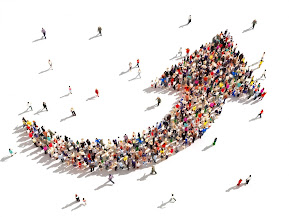What is an Online Influencer?
In today's society, much of our lives is dominated by online media. Most of our entertainment, communication, news, shopping, and information comes from the internet. Although the internet has many flaws, it has also created many opportunities and jobs for its users. One of these opportunities is a career as an online influencer.
Online influence has been around almost since the beginning of the internet starting in the form of blogs. However, it is important to note that online influencers do not only include the stereotype that most people think of. For example, many people will mention Charli D'Amelio, James Charles, Zach King, and others when asked to name an influencer. However, these people only make up a portion of online influence. Online influencers can include social media personalities, athletes, reporters, journalists, industry leaders, Hollywood, and you as the consumer.
Let us look at its definition to better understand how online influence consists of all these people. According to the Oxford English Dictionary, an online influencer is “a person who has become well-known through use of the internet and social media, and uses celebrity to endorse, promote, or generate interest in specific products, brands, etc., often for payment.” However, I like the Merriam-Webster Dictionary's version better, which says an online influencer is “a person who inspires or guides the actions of others.” Combining these two definitions, we can conclude that an online influencer is someone online who guides or promotes brands or ideas.
What do they do?
Online influencers serve many purposes to the public. They are personalities, experts, or consumers who spread opinions and information to the masses. They may do this through various outlets such as social media, blog websites, television, articles, and more. Their main goal is to become "opinion leaders" of users on the internet and brands use these positions to help sell their products or agendas.
For example, let's say a sports brand wants to launch a new line of products for women athletes. A smart marketing strategy for the brand may be to approach someone like Serena Williams, Simone Biles, or another woman famous on social media for athletics to post or advertise the new line. These people act as representatives or spokespeople for the brand, and for some people, this can be a fruitful career opportunity.
However, when choosing an influencer, brands analyze several underlying mechanisms to find the best fit for the position. These mechanisms are credibility, trustworthiness, attractiveness, expertise, popularity, and familiarity. These characteristics enable brands to see how consumers will react to an influencer promoting their products. Of these, I believe credibility and trustworthiness are two of the most important. If an influencer has a reputation for spreading misleading information, consumers are less likely to buy a product or think highly of a brand.
How do online influencers affect us?
The position of an online influencer has both good and bad effects on our world. First, online influence has created thousands of jobs in the U.S. and worldwide. This is especially true for younger generations such as Generation Z and Millennials. Not only are there plenty of opportunities to get a job, but this career can be quite profitable, as many people make hundreds of thousands of dollars. In addition, online influencers are a quick, easy marketing tool for brands that boost the economy as seen when the influencer market jumped from 2 billion to 13.8 billion in 2021.
Influencers also have a platform to spread awareness and information. This can have a good effect as they can teach people about topics and organizations that support things such as a cure for cancer, world hunger, deforestation, and more. Or they can simply spread information about the news or events happening in a certain field. However, this is not always the case and unfortunately, we do not live in a perfect world. Quite often, influencers may also use their platforms to spread misinformation or complete disinformation. This can be seen frequently in politics for the masses to side with the influencer's chosen candidate or bill.
Finally, influencers can ruin the reputation of a brand through their actions. We frequently see stories in the news and on social media of personalities being canceled for accusations of sexual assault, abuse, racism, and more. Not only do these actions hurt the reputation of the influencer, but they can also fall back on the company they are contracted with if the situation is handled poorly. For example, when this controversy appears, brands drop their contract or fire the influencer; however, if they do not take action, the internet will not fail to flame the brand as well.








No comments:
Post a Comment